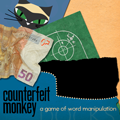Counterfeit Monkey — 15 of 292
Emily Short
Section 4 - Achievements
[Achievement file handling is adapted from the Recorded Endings extension used in Alabaster.]
The File of Conclusions is called "monkeyac".
When play begins (this is the load conclusions when starting rule):
read the achievements.
Last carry out restoring the game (this is the load conclusions when restoring rule):
read the achievements.
To read the achievements:
if the File of Conclusions exists:
read File of Conclusions into the Table of Possible Achievements.
To record (slug - some text) as an achievement:
read the achievements;
let N be indexed text;
let N be "[slug]";
unless N is a used achievement:
choose a blank row in the Table of Possible Achievements;
now the achievement entry is N;
unless the location is nautical:
say "[first custom style][line break]Achievement accomplished: [N]![line break][roman type]";
write File of Conclusions from the Table of Possible Achievements.
Table of Possible Achievements
| achievement (indexed text) | |
| indexed text | |
| with 40 blank rows. |
Table of Final Question Options (continued)
| final question wording | only if victorious | topic | final response rule | final response activity |
| "review the ACHIEVEMENTS you've reached so far" | false | "review/achievements" | list achievements rule | -- |
| "learn about some of the SOURCES used in creating this game" | true | "sources/source/learn" | list sources rule | -- |
This is the list achievements rule:
read the achievements;
unless the number of filled rows in the Table of Possible Achievements is 0:
sort the table of Possible Achievements in achievement order;
say "The achievements you have accomplished so far include: [paragraph break]";
repeat through the Table of Possible Achievements:
say " [achievement entry][line break]".
To decide whether (chosen ending - indexed text) is a used achievement:
let N be indexed text;
let N be "[chosen ending]";
repeat through the Table of Possible Achievements:
if N is achievement entry:
yes;
no.
This is the list sources rule:
say "I started working in earnest on this game in 2008. Since that time, the US has undergone two presidential elections; for months, the Occupy Seattle protests filled a city block just a short stroll from my apartment; and the successes and failures of the Arab Spring were constantly in the news. These experiences introduced more serious themes into what was initially a purely silly game.
Gene Sharp's [i]From Dictatorship to Democracy[/i] and the documentary [i]How to Start a Revolution[/i] helped me think about peaceful revolutions and the communication of dissent within totalitarian regimes.
The history of Atlantis['] colon[ization] mirrors that of nearby Gibraltar, on the theory that the same powers would have been likely to take an interest. Wikipedia supplied most of the potted history I used for this.
Arika Okrent's [i]In the Land of Invented Languages[/i] and Mark Rosenfelder's [i]Language Construction Kit[/i] (first a website, subsequently a book) taught me a lot about existing constructed languages and helped me imagine what might interest Atlantean academics.
[i]Poor Economics[/i] (Abhijit Banerjee, Esther Duflo) provided some general background about different attempts to address global poverty, contributing to the Atlantean concept of utopian linguistics (and why it hadn't yet saved the world).
The Scrabble dictionary and the internet anagram server, among others, helped me map out the puzzle space systematically.
Hundreds of other small details came out of YouTube or Wikipedia, from the composition of classic cocktails to the mating behavior of pigs. Background for specific elements may be found in the game's source text."
